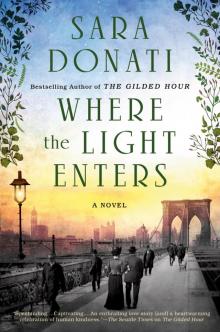- Home
- Sara Donati
Dawn on a Distant Shore Page 6
Dawn on a Distant Shore Read online
Page 6
“That’s Adele,” said Robbie, one corner of his mouth twitching upward as they watched the woman move about the room, hips swinging. “A widow woman, is she no’? One o’ Angus’s muny special friends.”
Moncrieff smiled over the edge of his tankard. “Aye, I’ve a few friends in Montréal. Until today I counted Jones among the useful if less pleasant o’ them.”
Nathaniel said, “We weren’t there to start a fight with the man.”
“That I can weel believe. But it’s uncommon easy to quarrel wi’ Jones. ‘Big heid and wee wit, never gaed tegither yet.’ Or so it’s said.”
Robbie snorted in appreciation.
Moncrieff chewed on the stem of his pipe and stared at Nathaniel for a moment. “You were planning to pay Jones to slip Hawkeye and Otter out o’ the garrison gaol.”
Nathaniel shifted, trying to find a more comfortable spot on the settle. “And if we were?”
Another Gallic shrug. “It isna an especially guid plan to put faith or your money on a man like Jones. He’d sell his mither to the de’il, and were there profit in it.” Moncrieff met Nathaniel’s eye. “And o’ course, he’s heard tell o’ this Tory gold. He’d be thinking you’ve got it wi’ ye, and wondering how to get his hands on it.”
Carefully, Nathaniel put down his tankard as he looked Moncrieff in the eye. “He ain’t the first, nor the last, I imagine. But I’ve got no gold on me, since you seem to be wondering.”
It was almost a relief to see the man flush. He put his pipe aside, laid both hands flat on the table, and rocked forward, as if to push it to the floor with his weight.
“I care naething for gold, and had ye a pure ton o’ it. It’s your faither’s fate that concerns me, and getting him out o’ gaol. Had I thought it could be done wi’ coin alone, I should ha’ seen it done lang syne. My purse isna empty, man.”
After a long moment, Nathaniel nodded. “Fair enough.”
Robbie cleared his throat. “I suppose ye’ve got a better plan, Angus?”
“Aye, Rab, perhaps I do. If you care to hear it told.”
The serving woman came to refill their tankards, and they were quiet while they waited for her to finish. She took her time, leaning over the table to display her ample bosom to Moncrieff. He patted her hand and murmured something Nathaniel did not quite hear, but understood anyway. Adele left them with a smile.
Nathaniel held up a hand to keep Robbie from answering the question that still hung in the air. “Before this goes any further—”
Moncrieff sighed. “You want an explanation for my letter. Aye, and I’ve earned some harsh words. Go on, then.”
“You admit it?”
“Admit that I lied in my letter, and that it wasna your faither’s idea to send for ye? Aye, I admit it. And tell me this: wad ye rather be hame the noo, and him in gaol? I havena kennt ye verra lang, Nathaniel Bonner, but I didna think that wad sit weel wi’ ye.”
With every swallow of ale Moncrieff’s English was giving way to Scots. Whether it meant the man was telling the truth or moving farther afield of it, of that much Nathaniel could not be sure. He said, “I would rather have had the whole story, and made up my own mind.”
With one fingertip, Moncrieff traced the gouges on the table as if they were an alphabet he alone could read. He had the hands of a man who earned his living with books and paper and ink: fine fingered and un-scarred. Nathaniel wished for five minutes of his father’s counsel, for he truly did not know what to make of Angus Moncrieff.
On the other side of the room, the sailor roused and hobbled out, tossing a coin to Adele. The man in the corner called for more ale and began to sing softly to himself: a German lullaby or maybe a love song, slow and melancholy. Outside, a girl scolded a herd of goats as she hurried them along, the sound of the bells clear and true in the cold air.
When Moncrieff looked up again, his color had settled and his tone was calmer. “Aye,” he said. “You’re right. I overstepped my bounds, and I apologize. But now ye’re here. You can ha’ my help, or leave it. Which will it be?”
Nathaniel sat back to consider.
Robbie had taken to Moncrieff, and after thirty years in the bush Robbie was wary of strangers and slow to give his friendship. He could make a mistake, certainly. But maybe he had not. Elizabeth, who had a keen ear for things left unstated and no patience with half-truths, had not been terribly worried by Moncrieff. She had put the case before Nathaniel with her usual simplicity and clarity: If Hawkeye decides he needs to go to Scotland, then he will go. However unlikely it seems to us that he might want to do such a thing, he has the right to decide for himself. And it was the truth; Nathaniel could admit it to her and to himself, but he could not allow Moncrieff to see it in his face.
There were other truths that couldn’t be overlooked: they had made an enemy of the man who was their only link to the gaol, whereas Moncrieff had connections, and an idea.
“First things first,” Nathaniel said. “Tell me what it is you want with my father once he’s free.”
“It’s verra simple,” Moncrieff said softly. “The Earl o’ Carryck would like to find his heir before he dies. The laird’s wish is that the land and holdings …” He paused, and then went on. “And the title stay in the family. Nae mair, nae less than that. What I want from your faither is an hour o’ his time, to tell him o’ his kin, and his birthright.”
Nathaniel nodded. “You’ll have your hour. But listen first, and I’ll tell you now what I know in my gut to be true. Maybe my father was born a Scott of Carryck—you seem to be sure of that, and I can’t say you’re wrong—but he was raised in the wilderness and in his heart he’s more Mahican than white.”
“And yet he married a Scotswoman,” Moncrieff said.
“Who turned her back on Scotland.” Nathaniel leaned closer. “Listen to me. Even if that earldom is rightfully his, he’ll want nothing to do with it. He’ll never get on a ship for Scotland of his own free will. If he tells you that to your face, will you leave here, and go home?”
A flicker in the deep brown eyes: anger or disbelief or perhaps just stubbornness. But Moncrieff inclined his head. “Aye, if your faither tells me sae, I’ll be awa’ hame to Scotland.”
“I’m not coming, either,” added Nathaniel. “I’ll have no part of it. Are we clear on that?”
“Aye,” said Moncrieff. “Verra clear.”
Robbie clapped Nathaniel on the back, laughing. “By God, laddie, ye should o’ been a lawyer. Angus, tell us wha’ ye’ve got in mind.”
Moncrieff took a long swallow and then pulled a kerchief from his sleeve to wipe his brow. “The cook,” he said finally, and in response to the blank look he got from both of them, he produced a slanted grin. “Martin Fink, the Somervilles’ cook. He has a weakness for cards and whisky, a verra bad combination for a man o’ limited resources.”
Nathaniel frowned. “Can a cook get us into the gaol, or our people out of it?”
“Ach, nothing so simple as that,” said Moncrieff. “But he can let ye bide in Pink George’s kitchen, and that’s where ye need to be, this evening. Giselle’s invited me tae one o’ her parties, and she intends to have Otter and Hawkeye there.”
Nathaniel remembered Giselle’s parties very well. She gathered men around her for the evening when her father was away, more concerned with amusement than reputation. He had never enjoyed them, and liked the idea even less now. “You’re thinking we’ll just walk them out of the lieutenant governor’s mansion?”
“At the right moment, aye. And why not?”
Why not. Nathaniel hid his grin in his tankard. It was a beautifully simple plan. At the most it would require that they waylay the redcoats assigned to guard the prisoners. With the right management, they would be drunk, too.
But Robbie was blinking at Moncrieff in disbelief, his color rising fast.
“Are ye saying that Giselle has summoned Otter and Hawkeye tae entertain the lairds and officers, like trained monkeys? Hawkeye will ha’ nane o’
that, and should she stand him at the end of a musket.”
“That may be true,” Moncrieff said, lowering his voice. “But think on it, Rab. They’ll aa be fu’ o’ drink by midnight. By morning they’ll be sober, and we’ll be lang awa’.”
“My father will see the beauty of that, if we can get word to him.” Nathaniel put a hand on Robbie’s shoulder. “He’d go a far sight further to get out of gaol than sit next to Giselle Somerville at a dinner table.”
Robbie frowned. “Pink George will be in a puir temper when he comes hame and hears o’ it. It wadna be the first time he’s raised a hand tae his dauchter.”
“She’ll have to handle that on her own,” said Nathaniel, more loudly than he intended. “She’s had to deal with him angry, she knows what she’s about.”
“Ye’re an unco’ hard man betimes, Nathaniel Bonner.” Robbie sighed, rubbing the bridge of his nose with one broad thumb. “Wha’s first then in this plan o’ yours, Angus?”
“The gaol. We’ve got to get word to Hawkeye. Wee Iona would be willing to pay a call, perhaps.”
“No’ Iona,” Robbie said in a tone that brooked no discussion.
Nathaniel nodded in agreement. “She’s too well known to get involved in this.”
Moncrieff studied the tabletop. After a moment, he turned to look over his shoulder at Adele, who was sitting on a stool by the hearth and tending a kettle of beans. She was up before he could even wink at her, soft curves and a warm smile.
“Perhaps a friend, then, wi’ a bit o’ beef, and a message tucked away in a safe place.” He rose with his tankard in hand, tipping back his head to get the last swallow. “I need a private word wi’ Adele. Tell me, man. How are ye at cards?”
“I’m better with a rifle,” said Nathaniel.
“He’s better wi’ a bluidy sewin’ needle.” Robbie grinned.
Nathaniel shrugged. “I expect that’s true,” he said. “There ain’t much I like less than cards.”
“You won’t have to pretend to lose, then.” Angus nodded, satisfied. “Perhaps you and Robbie would care to see if there’s any interest in a game.” He raised one brow in the direction of the man singing into his ale, and then headed toward the back room where Adele had disappeared.
Robbie straightened, his face creased in confusion. “Why wad we want tae play cards wi’ a whey-faced sot like that?” he asked, sending a fierce look toward the corner.
“Because that’s Martin Fink,” Nathaniel said. “Did you think Moncrieff steered us here by accident?”
Robbie started. “The Somervilles’ cook, d’ye mean? Mary bless me, and sae it must be.” He rubbed a hand over his face. “I wadna ha’ guessed Angus tae be sae verra sly.”
Nathaniel picked up his tankard to swallow the last of his ale, and along with it the worst of his doubts about Angus Moncrieff. They were started down this road now and they would see where it took them, but he would be on guard. He clapped Robbie on the back and leaned over to whisper in the great shell-like ear. “You watch my back, Rab, and I’ll watch yours.”
A forest away, Elizabeth was half asleep in front of the hearth with both infants at her breast, when faint laughter startled her into full wakefulness.
“What was that?”
Hannah looked up from grinding corn, and wiped a strand of hair away from her face with the back of her hand. “What was what?”
Confused, Elizabeth settled back into the rocker. “I heard something. Perhaps I was dreaming.”
“About my father,” Hannah concluded.
With a yawn she could barely hold back, Elizabeth pulled the pillows that supported the twins closer to her. There were longer pauses now between gulps, and soon they would be asleep. Elizabeth thought of the cradle and her own bed in the other room, but she was simply too weary to move, and she let herself drift back toward sleep just where she was. For three weeks now she had never had as much as three hours of continuous rest; it was no surprise if she was beginning to confuse waking and sleeping dreams.
Hannah looked worn down, too. All day long she worked, she and Liam with Curiosity’s help, to keep the household running, food on the table, the firewood stacked, the hearth cleaned. Seldom did Elizabeth miss her girlhood home, but she found herself thinking more and more these days of Aunt Merriweather’s legions of servants. At Oakmere, little girls had been free to be little girls.
As long as they weren’t overly interested in the contents of the library, she reminded herself.
Voices outside, coming closer. Liam and Curiosity, and perhaps one of Curiosity’s daughters or Martha Southern, up from the village to bring a covered dish or a pound of butter, for they kept no cow here on the mountain. She had good neighbors; they did what they could to help. Elizabeth knew that she should rouse herself, put the babies in their cradle, her clothing to rights, comb out her hair, wash her face, make tea, help with the corn bread, the endless laundering of swaddling clothes, the mending. The ash barrel, the candle box, the spindle, the mortar and pestle—they all called out to her. But the fire crackled peaceably and the babies were so heavy, pinning her down to her chair, to the earth itself: it felt as if she would never be able to stand on her own two feet, to move unencumbered, ever again.
And still, and still. She could not look at them without having her throat close with tears that were equal parts exhaustion and joy: Mathilde’s round cheeks working rhythmically even in her sleep; Daniel’s small hand spread out on the white skin of her breast.
Voices closer still; Hannah listening now, too, her head cocked to one side, plaits swinging free to her waist. Curiosity must be in the middle of a story. She had so many of them, but the children were always asking for more. They were all storytellers, these people who carved out lives for themselves on the edge of the frontier. It would be years before she had heard all of Nathaniel’s.
With her husband’s image foremost in her mind, Elizabeth finally let sleep claim her, thinking of the stories he might bring back with him from Montréal, and wondering how much longer it would be before she would hear his voice again.
Deeply asleep, she did not see the flush of excitement and pleasure on Hannah’s face at the sound of steps on the porch. Her chores forgotten, Elizabeth and the babies forgotten, Hannah flew across the room as the door opened for the travelers: her aunt Many-Doves with a wide smile and a cradleboard peeking over her shoulder; Doves’ husband, Runs-from-Bears, grinning at her as he swung a willow carry-frame to the floor; and Falling-Day, wrapped in a mantle of fisher pelts the same deep color as her eyes and hair, so much like Hannah’s own. With small sounds of welcome, of relief, of joy beyond bearing, Hannah flung herself into her grandmother’s open arms.
5
The Somervilles’ basement kitchen was as deep and dim as a cave, but there was nothing cool about it: the combined heat of hearth and ovens had set even the walls to sweating. From a remote corner where they were supposed to be waiting to resume their day-long card game with Martin Fink, Nathaniel and Robbie watched the man scramble to send course after course up to Giselle and her guests.
She hadn’t lost her appetite for the unusual. In addition to platters of fancy meat pastries, tureens of soup and ragout, a suckling pig, roast mutton, a haunch of venison, three kinds of fish, every manner of pickled or potted vegetable, and breads and rolls stacked in elaborate patterns, there had been a roast swan shouldered by not two but four serving men. Dressed again in its own white feathers after being stuffed, the long neck held up by hidden skewers, the bird went up the stairs, surrounded by doves baked in nests of puff pastry.
Now Fink was laboring over a huge meringue, decorating it with candied fruit. It reminded Nathaniel of the powdered wigs that had gone out of fashion not so long ago. The cook circled the platter with one eye squeezed shut and a finger pressed to his mouth. Finally he stood back, looked over at the men in the corner, winked conspiratorially, and burst into noisy song. Dish by dish, his mood improved and his songs became louder.
“Aye, sing awa’, ye daft bugger,” muttered Robbie. “The man canna wait tae take the rest o’ the silver frae ye, laddie.” He might rarely play cards, but Robbie was having a hard time purposely losing to a half-drunk Alsatian cook with the habit of singing publicly, and off-key. In a burst of winner’s generosity, Fink had offered them the finest his kitchen had to offer, but Robbie had accepted only bread and some cold venison. Now he tore off great chunks, never taking his eyes from the cook.
Nathaniel swallowed down a yawn. There would be at least another hour of this: the servants were fussing over blue-veined cheeses, fruit compotes, liquors and coffees and drinking chocolate. Things he had never heard of before he came to Montréal, or thought of much since leaving it. Suddenly the wish to be home was strong enough to make him get to his feet. He pulled on his mantle and picked up his rifle by its sling and slipped it over his shoulder. “I think I’ll have a look around upstairs until Fink’s ready to deal the next hand.”
Robbie gaped up at him. “And how d’ye plan tae do that, wi’ a hoose fu’ o’ redcoats? I suppose Giselle has a secret stair hidden awa’?”
“Not so secret,” said Nathaniel. “I wouldn’t want to guess how many men know about it, but it’s likely that a few of them are at the dinner table right now.”
“Gin that’s the case,” said Robbie, tucking the remainder of his bread and cheese into his sack and lumbering to his feet, “I micht as weel come wi’ ye. Yon glaikit lump”—he pointed at Fink with his chin—“will ha’ nae use for us afore the eatin’s done. Tell him we’re goin’ tae empty our bladders.”
• • •
It was good to be out of the kitchens, away from the accumulated smells of a thousand meals. Nathaniel drew in cold air and paused in the courtyard, listening. There was no sign of the guard; they were probably warming themselves inside, sloppy with Somerville away.

 The Endless Forest
The Endless Forest Into the Wilderness
Into the Wilderness Queen of Swords
Queen of Swords Dawn on a Distant Shore
Dawn on a Distant Shore Lake in the Clouds
Lake in the Clouds Fire Along the Sky Fire Along the Sky
Fire Along the Sky Fire Along the Sky Where the Light Enters
Where the Light Enters Fire Along the Sky
Fire Along the Sky